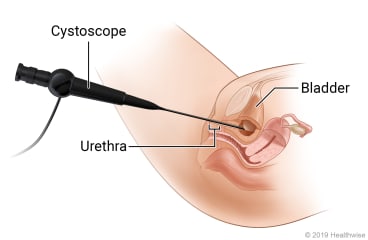Transurethral Resection of the Bladder: Before Your Surgery

What is transurethral resection of the bladder?
Transurethral resection of the bladder is a surgery to remove abnormal tissue (tumour) from the bladder through the urethra. It is also called transurethral resection of bladder tumour, or TURBT.
A tumour in the bladder may be benign (not cancer) or malignant (cancer). This surgery uses a special tool to find and remove a tumour from the bladder. A small sample (biopsy) of the lining of the bladder may also be taken. Any removed tissue will be checked for cancer cells.
The doctor will put a thin, lighted tool into your urethra. This tool is called a cystoscope or scope. The urethra is the tube that carries urine from the bladder to the outside of the body. The doctor will gently guide the scope into your bladder. Your bladder will then be filled with fluid. This stretches the bladder so that your doctor can clearly see the inside of your bladder. Your doctor will use small tools through the scope to take out and/or burn away any abnormal tissue.
How do you prepare for surgery?
Surgery can be stressful. This information will help you understand what you can expect. And it will help you safely prepare for surgery.
 Preparing for surgery
Preparing for surgery
- Be sure you have someone to take you home. Anesthesia and pain medicine will make it unsafe for you to drive or get home on your own.
- Understand exactly what surgery is planned, along with the risks, benefits, and other options.
- If you take a medicine that prevents blood clots, your doctor may tell you to stop taking it before your surgery. Or your doctor may tell you to keep taking it. (These medicines include aspirin and other blood thinners.) Make sure that you understand exactly what your doctor wants you to do.
- Tell your doctor ALL the medicines and natural health products you take. Some may increase the risk of problems during your surgery. Your doctor will tell you if you should stop taking any of them before the surgery and how soon to do it.
- Make sure your doctor and the hospital have a copy of your advance care plan. If you don't have one, you may want to prepare one. It lets others know your health care wishes. It's a good thing to have before any type of surgery or procedure.
What happens on the day of surgery?
Follow the instructions exactly about when to stop eating and drinking. If you don't, your surgery may be cancelled. If your doctor told you to take your medicines on the day of surgery, take them with only a sip of water.
Take a bath or shower before you come in for your surgery. Do not apply lotions, perfumes, deodorants, or nail polish.
Take off all jewellery and piercings. And take out contact lenses, if you wear them.
At the hospital or surgery centre
When should you call your doctor?
- You have questions or concerns.
- You do not understand how to prepare for your surgery.
- You become ill before surgery (such as fever, cold or influenza [flu], chest pain, or shortness of breath).
- You need to reschedule or have changed your mind about having the surgery.
Where can you learn more?
Go to https://www.healthwise.net/patientEd
Enter T220 in the search box to learn more about "Transurethral Resection of the Bladder: Before Your Surgery".
Current as of: April 30, 2024
